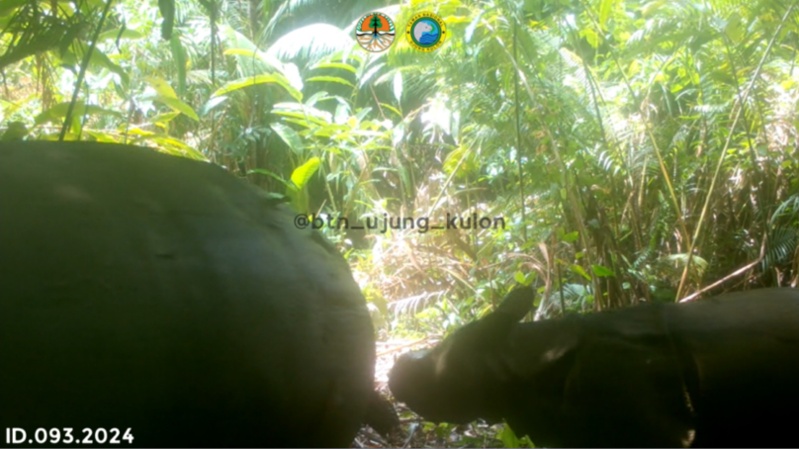Camera Trap Spots a Rare Javan Rhino Calf

09 April 2024
A Javan rhino calf was recently spotted on camera trap in Indonesia’s Ujung Kulon National Park. Indonesia’s Ministry of Environment and Forestry (MOEF) shared video footage of the calf and its mother on their social media channels.
Javan rhinos are mostly solitary, wary of humans and hide easily in the dense jungle, so these motion-activated camera traps are one of the best tools to monitor the population. This calf was spotted in March, 2024 and is estimated to be 3 to 5 months old. Javan rhino calves typically stay with their mothers for their first 1½ to 2 years. In this video you can see the calf following its mother closely before they both leave the camera’s view as quickly as they appeared.
Once roaming throughout southeast Asia, the Javan rhino now only exists in Ujung Kulon National Park. In an official statement, the Director General of Natural Resources and Ecosystem Conservation, Satyawan Pudyatmoko, said: “We should not be lulled by the joy of finding this birth.” With all the world’s Javan rhinos living in one location, the species is susceptible to various threats including potential inbreeding depression, natural disasters, disease and a recently heightened concern for poaching. “For this reason, we and all parties who assist in efforts to preserve the Javan rhino must not be careless and always anticipate any threats that might occur,” Pudyatmoko said.
There is an ongoing investigation into suspected Javan rhino poaching discovered last year. In response, the National Park is currently closed to the public and is implementing increased security measures as part of its full protection system. Rhino Protection Units patrol the waters surrounding the peninsular Park by boat, as well as on foot within its boundaries. Monitoring teams have camera traps set up strategically throughout the Park to monitor individual rhinos and track changes in the population, like new calves.
“It’s encouraging to see these rhinos continue to breed successfully. The world certainly needs more Javan rhino calves to combat the challenges they face,” said Nina Facsione, executive director of the International Rhino Foundation. “The rhinos are doing their part; we need to do our part to ensure the population remains safe and can continue to grow.”
The International Rhino Foundation is committed to supporting the MOEF, Ujung Kulon National Park, and our local NGO partners in protecting and monitoring the Javan rhino and its habitat.

